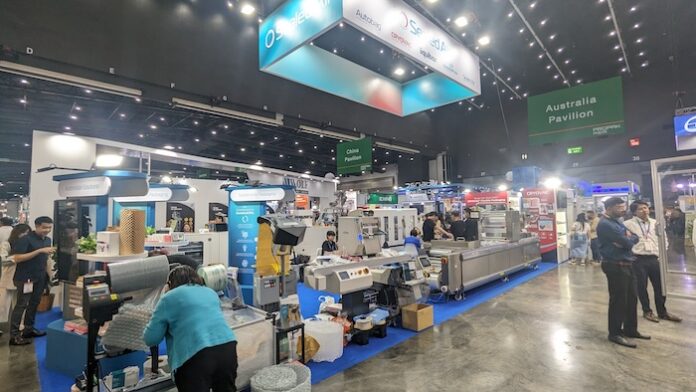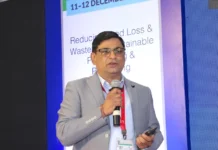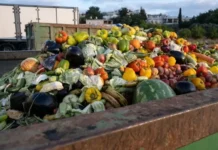Sealed Air showcased its range of products and solutions at Propak Asia 2025, highlighting its strength in automation, innovation, and sustainable packaging.
In packaging, the company has a brand named Cryovac for food packaging. There are BubbleWrap and Instapak for protective packaging and Autobag for automation solutions, among other brands. In a conversation with the team, IndiFoodBev got insights about the company’s products and their offerings for the packaging industry.
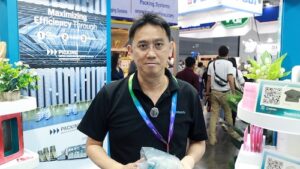
Photo- PSA
Among the innovations on display were paper-based cushioning and void-fill solutions. Viboon Pratruangkrai, sales director for Sealed Air Thailand, informed us that these paper solutions are for the eCommerce and logistics sectors that demand both protection and sustainability.
Sealed Air’s range includes foam packaging with up to 80% recycled content, and in some cases, 100% recycled content through what they refer to as HRC foam (high recycled content).
Pratruangkrai pointed out that even the company’s flagship air bubble packaging now contains up to 80% recycled content. “We emphasize putting more recycling into each product we offer,” he said.
Another solution was Sealed Air’s void fill packaging made with 95% recycled content, aimed at improving packaging performance while being environmentally conscious.

Photo- PSA
Then there was thermoforming technology—a process widely adopted in processed food packaging. Pasan Puttawiriyan, sales manager of food packaging at Sealed Air, introduced Sealed Air’s latest thermoforming film, currently being supplied to customers in Thailand.
The company has developed a recycle-ready thermoforming film, designed with both top and bottom webs compatible with recycling systems. “This represents the next phase in our packaging solutions, aimed at enhancing sustainability for our customers,” he said.
The multi-layer sealing films, typically used to extend the shelf life of packaged foods, have undergone a sustainable transformation. Sealed Air has introduced mono-material CPP (cast polypropylene)-based films, which are recyclable and can be reheated. These mono-material sealing films serve as a replacement for conventional multi-layer films, enabling both recyclability and performance, critical factors in reducing environmental impact.
“Our solutions at Propak Asia reflect our deep commitment to customer-centric, sustainable packaging,” Puttawiriyan said. “Our goal is not just to meet regulatory requirements but to deliver packaging that prolongs shelf life, maintains taste and freshness, and reduces production waste.”
According to Puttawiriyan, by integrating high-performance equipment with advanced materials, Sealed Air ensures greater operational efficiency for food manufacturers, while supporting their goals of reducing environmental impact.
Automation solutions
Apart from sustainability, automation was another focus point. “We want to emphasize our automation solutions that help maximize efficiency in warehousing, production lines, and packing operations,” Pratruangkrai said. According to him, automation enhances productivity and helps businesses address cost pressures and operational challenges.
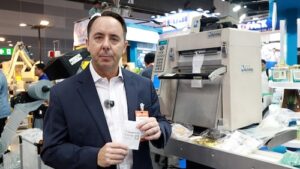
Photo- PSA
Cooper Tyo, APAC automation solutions manager at Sealed Air, talked about the Autobag machine and its growing relevance across industries in Asia-Pacific. “We are highlighting our competency in bagging solutions,” Tyo said, introducing the Autobag machine that automates printing, opening, filling, and sealing bags—delivering speed, accuracy, and flexibility for packaging lines.
The system ensures each bag carries customized information, streamlining fulfillment processes, particularly in sectors such as automotive spare parts, electronic accessories, and e-commerce. Tyo said this capability is vital for operations handling thousands of small items with unique identifiers or destination labels.
The Autobag system is flexible. “We can switch from a small-sized bag to thrice the size in less than a minute,” Tyo noted. This adaptability allows businesses to manage a wide range of packaging sizes without separate machinery for each application. With options dedicated to varied production speeds and bag sizes, the Autobag lineup meets both high- and low-volume packaging demands.
The Autobag systems have been a major contributor to expanding the company’s customer base in Southeast Asia, Tyo said, adding, “We produce both the machines and the materials.” Autobag machines are also made in the United States.
On ProPak Asia, Pratruangkrai said, “We participate every year. It is a great platform to meet existing and new customers and showcase our innovations.” It helps the company to expand its market reach, generate leads, and introduce new technologies to the Thai market and beyond.
Tyo said its consistent presence at the event has enabled the company to build stronger relationships, gain industry visibility, and stay ahead in emerging markets across Asia.
Sealed Air plans to continue building on its twin pillars of sustainability and automation. “Our focus remains on environment-friendly solutions and increasing efficiency to help reduce labor cost and overcome warehousing challenges,” Pratruangkrai said. The company aims to support customers in navigating industry shifts with innovative, responsible, and smart packaging technologies.
Summing up the company’s offering, Puttawiriyaan emphasized that their automation and total packaging solutions meet the needs of customers in Thailand and beyond. “We are not only supplying packaging, we are delivering solutions that support the environment, optimize production, and bring value to our partners.”
IndiFoodBev — authentic, impactful and influential
An English-language food and beverage processing and packaging industry B2B platform in print and web, IndiFoodBev is in its third year of publication. It is said that the Indian food and beverage industries represent approximately US$ 900 billion in revenues which implies more than 20% of the country’s GDP. Eliminating the wastage on the farmside can help to deliver more protein to a higher number of the population apart from generating sizable exports. The savings in soil, seeds, water, fertilizer, energy and ultimately food and nutrition could be the most immense contribution that country is poised to make to the moderation of climate change.
To improve your marketing and grow sales to the food and beverage processing and packaging industry, talk to us. Our research and consulting company IppStar [www.ippstar.org] can assess your potential and addressable markets in light of the competition. We can discuss marketing, communication, and sales strategies for market entry and growth.
Suppliers and service providers with a strategy and budget for targeted marketing can discuss using our hybrid print, web, video, and social media channels to create brand recognition linked to market relevance. Our technical writers are ready to meet you and your customers for content.
The second largest producer of fruit and vegetables in the world is continuously expanding processing capacities and delivery systems with appropriate innovative technologies. We cover product and consumer trends, nutrition, processing, research, equipment and packaging from farm to thali. Get our 2025 media kit and recalibrate your role in this dynamic market. Enhance your visibility and relevance to existing markets and turn potential customers into conversations. Ask for a sample copy of our bi-monthly in print or our weekly IndiFoodBev eZine each Wednesday.
For editorial info@ippgroup.in — for advertisement ads1@ippgroup.in and for subscriptions subscription@ippgroup.in
Naresh Khanna – 10 February 2025
Subscribe Now


